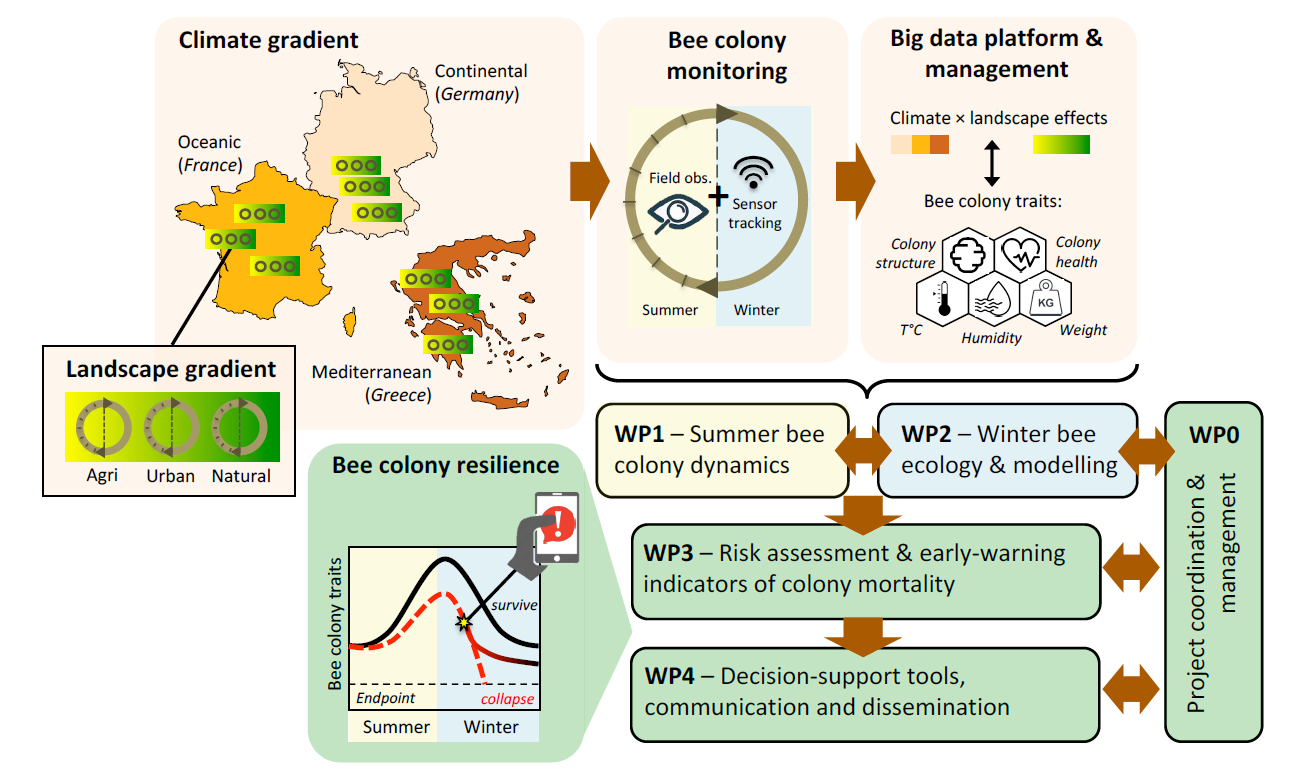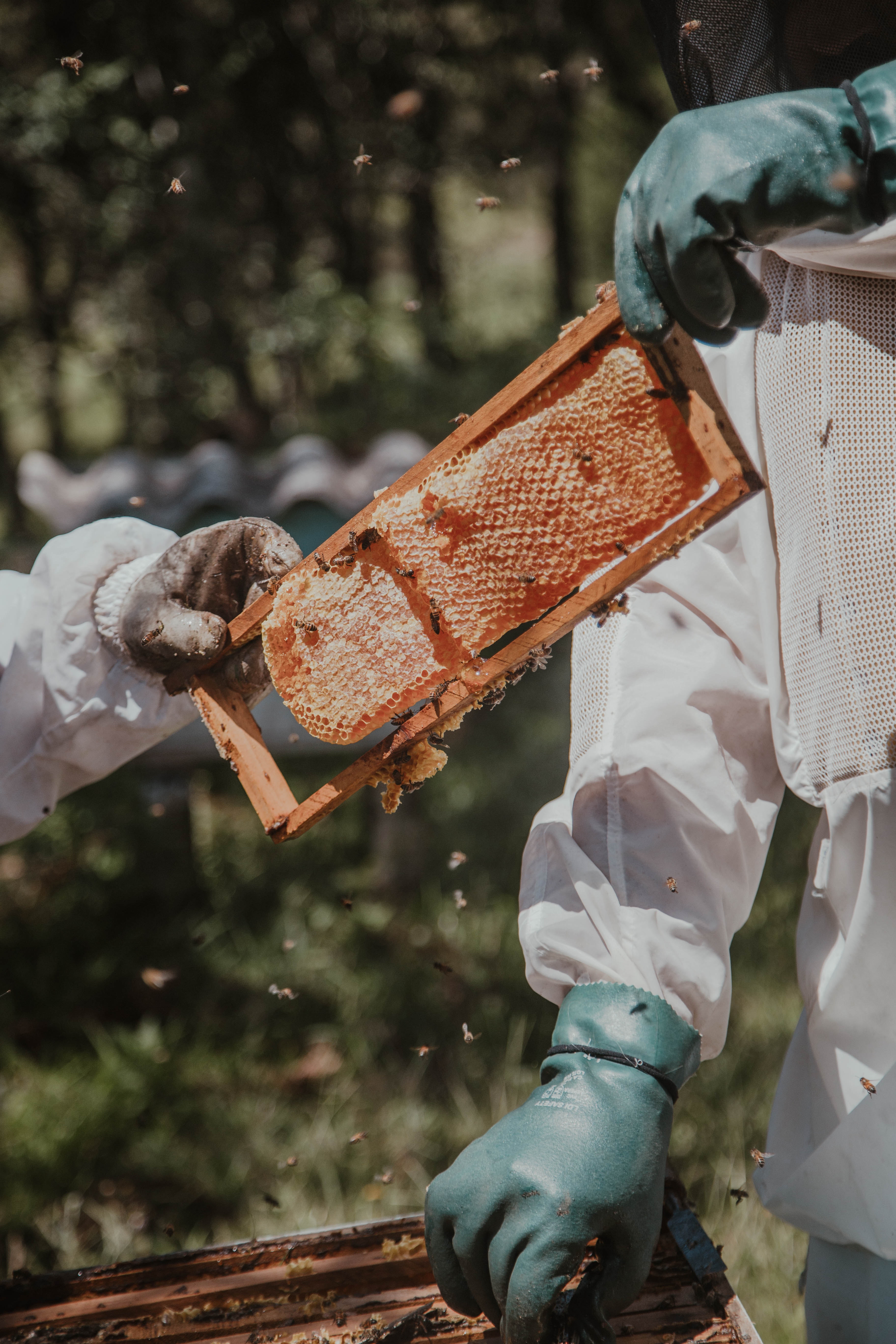
Introduction
BeeConnected aims to monitor honey bee colonies along gradients in climate and landscape structure using a combination of empirical field monitoring and automated winter surveys with low-cost connected sensors. The goal of the project is to understand mechanism underlying winter bee colony mortality and to identify early-warning indicators. The results could help beekeepers limiting colony losses and related economic deficits. Moreover, BeeConnected will bring together beekeepers, researchers, electronic engineers, and outreach designers (for transparent communication) in a transdisciplinary, multi-actor approach, to enable digital technology solutions for a transition towards sustainable and resilient beekeeping. BeeConnected aims also to investigate, develop and test new digital solutions based on data collection to deliver early-warning indicators of honey bee colony mortality and decision-support tools to help beekeepers limiting colony losses and related economic deficits.
Background
Over the past 20 years, the substantial and global decline of bees has been alarming as they provide critical pollination services. In particular, the mortality of honey bee colonies (Apis mellifera) has attracted a lot of attention due to its important role for human well-being by producing honey, sustaining populations of wild plants and supporting production of major crops. Unfortunately, abnormal high mortality rates of honey bee colonies have been revealed in several regions of the world, including Europe where it can reach up to 25–50% every winter. These mortality rates have strong impacts on beekeeper economy and sustainability, and consequences for associated services. Routine monitoring of colonies is nowadays a common practice of beekeepers to check for potential disorders, changes in productivity or to follow their performance in breeding apiaries. Such techniques are also used in research as monitoring to predict and anticipate disorders’ occurrence. Nevertheless, routine monitoring is only possible from spring to autumn since opening the hives when temperatures are cold put the colony survival at risk by failure in thermoregulation. Beehives are therefore considered as black boxes by beekeepers during winter, although the colony mortality mainly occurs during this critical period.
Main project activities
BeeConnected combines expertise in various scientific fields, including behavioural ecology, molecular biology, engineering, computer science, and modelling. In close collaboration with beekeepers, the project will carry out a large-scale monitoring of bee colonies along combined gradients in climate (continental, temperate and Mediterranean) and landscape structure complexity. The monitoring will combine empirical field observations with automated systems using multiple low-cost sensors to track the bee colony in real time and in three dimensions inside the beehives. Data will be associated with mechanistic models to assess the risk of colony mortality and to identify early warning indicators.

Expected social impact
BeeConnected will produce direct and strong outcomes for beekeeping through the monitoring in real time of the colonies with detection of abnormal behaviours and diseases, and the production of early warning indicators of mortality. These related decision-support tools will help beekeepers minimizing colony losses in winter to enhance beekeeping economy and sustainability. BeeConneced aims to develop low-cost tools in order to help a broad range of beekeepers to sustain their professional activity (i.e. avoiding colony loss).
Beyond beekeepers, BeeConnected will support farmers managing their increasing demand in pollination services. Changes in agricultural practices have lead to pollination deficits in entomophilous crops, leading to a growing interest in supplementing croplands with managed honey bee colonies, Apis mellifera. However, the metric of a colony, or a hive, as a pollination supplement unit is controversy due to the wide range of forager population sizes in a colony depending on variation in climate, season, and beekeeping management. Correctly measuring the number of honey bees per hive is critical for farmers to adjust the number of colonies they need for crop pollination demands. With the ICT connected beehives BeeConncted will develop a rapid and robust method to track inside size and behaviour of the honey bee colonies. The measures of the winter cluster size allow to estimate the population size of the colony and can therefore provide farmers an early indicator of colony efficiency for crop pollination.
Furthermore, small companies producing ICT tools will also benefit from the advanced results and technology development, creating or enhancing market opportunities as well as labour positions.
Beyond stakeholders, BeeConnected will foster the establishment of a multi actor collaborative platform, ensuring sustainable beekeeping, educating beekeepers and farmers in the use of new technology. This project will also promote direct exchanges among scientists, beekeepers and farmers, aiming to bridge the gap between research and action. Moreover, BeeConnected will benefit people and science related to the new knowledge the project will provide on the winter ecology of honey bees that is an important, fascinating, hidden side of the species.
Last but not least, the Citizen Science approach will foster higher appreciation, closer collaboration and trust among the beekeeping community.
Implementation and plans to reach target groups
BeeConnected will establish a multi actor collaborative web platform. This platform will present the project aims, development and results. The bee colony dynamics of volunteer beekeepers implied in the project will be available in real time on the web platform. Moreover, the project results will lead to protocols and guidelines, handy disease detection cards and management recommendations which will be available on the web platform too. Short and comprehensive video outputs will facilitate the dissemination of the knowledge gained. Scientific results will be published as open access in scientific journals and local beekeeping magazines to promote the dissemination of the project outcomes to a broad range of interested people.
Results will be also presented in conferences (for e.g. 47th Apimondia 2022, EurBee10 Congress 2022) and regular workshops and meetings will be organized over the project duration so exchanges among scientists and beekeepers are promoted.
Consortium
 Coordinated by:
Coordinated by:
Fabrice Requier - UMR EGCE; IRD, CNRS, Univ. Paris-Saclay, France
Partners:
 Ingolf Steffan-Dewenter - University of Würzburg - Department of Animal Ecology and Tropical Biology, Germany
Ingolf Steffan-Dewenter - University of Würzburg - Department of Animal Ecology and Tropical Biology, Germany

Fani Hatjina - Hellenic Agricultural Organization DEMETER - Dept. of Apiculture, Greece
Funded by:
- French National Research Agency, France
- General Secretariat for Research & Technology, Greece
- Federal Ministry of Food and Agriculture, Germany
News articles
Video
Introduction
BeeConnected aims to monitor honey bee colonies along gradients in climate and landscape structure using a combination of empirical field monitoring and automated winter surveys with low-cost connected sensors. The goal of the project is to understand mechanism underlying winter bee colony mortality and to identify early-warning indicators. The results could help beekeepers limiting colony losses and related economic deficits. Moreover, BeeConnected will bring together beekeepers, researchers, electronic engineers, and outreach designers (for transparent communication) in a transdisciplinary, multi-actor approach, to enable digital technology solutions for a transition towards sustainable and resilient beekeeping. BeeConnected aims also to investigate, develop and test new digital solutions based on data collection to deliver early-warning indicators of honey bee colony mortality and decision-support tools to help beekeepers limiting colony losses and related economic deficits.
Background
Over the past 20 years, the substantial and global decline of bees has been alarming as they provide critical pollination services. In particular, the mortality of honey bee colonies (Apis mellifera) has attracted a lot of attention due to its important role for human well-being by producing honey, sustaining populations of wild plants and supporting production of major crops. Unfortunately, abnormal high mortality rates of honey bee colonies have been revealed in several regions of the world, including Europe where it can reach up to 25–50% every winter. These mortality rates have strong impacts on beekeeper economy and sustainability, and consequences for associated services. Routine monitoring of colonies is nowadays a common practice of beekeepers to check for potential disorders, changes in productivity or to follow their performance in breeding apiaries. Such techniques are also used in research as monitoring to predict and anticipate disorders’ occurrence. Nevertheless, routine monitoring is only possible from spring to autumn since opening the hives when temperatures are cold put the colony survival at risk by failure in thermoregulation. Beehives are therefore considered as black boxes by beekeepers during winter, although the colony mortality mainly occurs during this critical period.
Main project activities
BeeConnected combines expertise in various scientific fields, including behavioural ecology, molecular biology, engineering, computer science, and modelling. In close collaboration with beekeepers, the project will carry out a large-scale monitoring of bee colonies along combined gradients in climate (continental, temperate and Mediterranean) and landscape structure complexity. The monitoring will combine empirical field observations with automated systems using multiple low-cost sensors to track the bee colony in real time and in three dimensions inside the beehives. Data will be associated with mechanistic models to assess the risk of colony mortality and to identify early warning indicators.
Expected social impact
BeeConnected will produce direct and strong outcomes for beekeeping through the monitoring in real time of the colonies with detection of abnormal behaviours and diseases, and the production of early warning indicators of mortality. These related decision-support tools will help beekeepers minimizing colony losses in winter to enhance beekeeping economy and sustainability. BeeConneced aims to develop low-cost tools in order to help a broad range of beekeepers to sustain their professional activity (i.e. avoiding colony loss).
Beyond beekeepers, BeeConnected will support farmers managing their increasing demand in pollination services. Changes in agricultural practices have lead to pollination deficits in entomophilous crops, leading to a growing interest in supplementing croplands with managed honey bee colonies, Apis mellifera. However, the metric of a colony, or a hive, as a pollination supplement unit is controversy due to the wide range of forager population sizes in a colony depending on variation in climate, season, and beekeeping management. Correctly measuring the number of honey bees per hive is critical for farmers to adjust the number of colonies they need for crop pollination demands. With the ICT connected beehives BeeConncted will develop a rapid and robust method to track inside size and behaviour of the honey bee colonies. The measures of the winter cluster size allow to estimate the population size of the colony and can therefore provide farmers an early indicator of colony efficiency for crop pollination.
Furthermore, small companies producing ICT tools will also benefit from the advanced results and technology development, creating or enhancing market opportunities as well as labour positions.
Beyond stakeholders, BeeConnected will foster the establishment of a multi actor collaborative platform, ensuring sustainable beekeeping, educating beekeepers and farmers in the use of new technology. This project will also promote direct exchanges among scientists, beekeepers and farmers, aiming to bridge the gap between research and action. Moreover, BeeConnected will benefit people and science related to the new knowledge the project will provide on the winter ecology of honey bees that is an important, fascinating, hidden side of the species.
Last but not least, the Citizen Science approach will foster higher appreciation, closer collaboration and trust among the beekeeping community.
Implementation and plans to reach target groups
BeeConnected will establish a multi actor collaborative web platform. This platform will present the project aims, development and results. The bee colony dynamics of volunteer beekeepers implied in the project will be available in real time on the web platform. Moreover, the project results will lead to protocols and guidelines, handy disease detection cards and management recommendations which will be available on the web platform too. Short and comprehensive video outputs will facilitate the dissemination of the knowledge gained. Scientific results will be published as open access in scientific journals and local beekeeping magazines to promote the dissemination of the project outcomes to a broad range of interested people.
Results will be also presented in conferences (for e.g. 47th Apimondia 2022, EurBee10 Congress 2022) and regular workshops and meetings will be organized over the project duration so exchanges among scientists and beekeepers are promoted.
Consortium
Fabrice Requier - UMR EGCE; IRD, CNRS, Univ. Paris-Saclay, France
Partners:
Fani Hatjina - Hellenic Agricultural Organization DEMETER - Dept. of Apiculture, Greece
Funded by:
News articles
Video